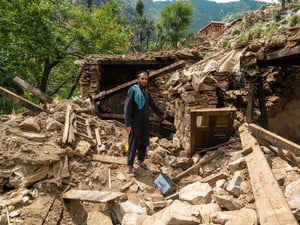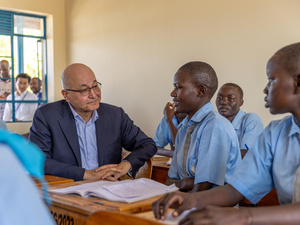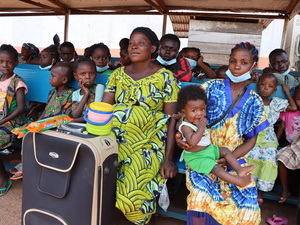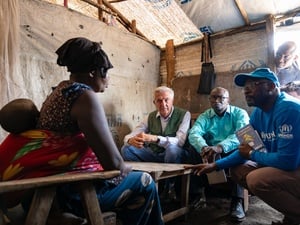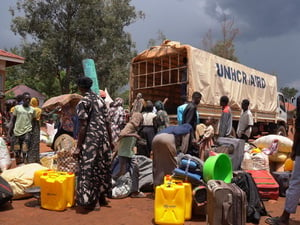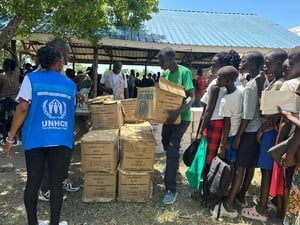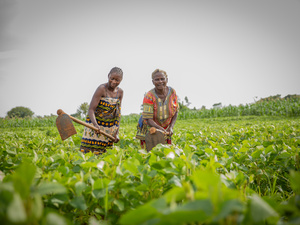Looking for solutions for North Kivu's vulnerable Pygmies
Looking for solutions for North Kivu's vulnerable Pygmies
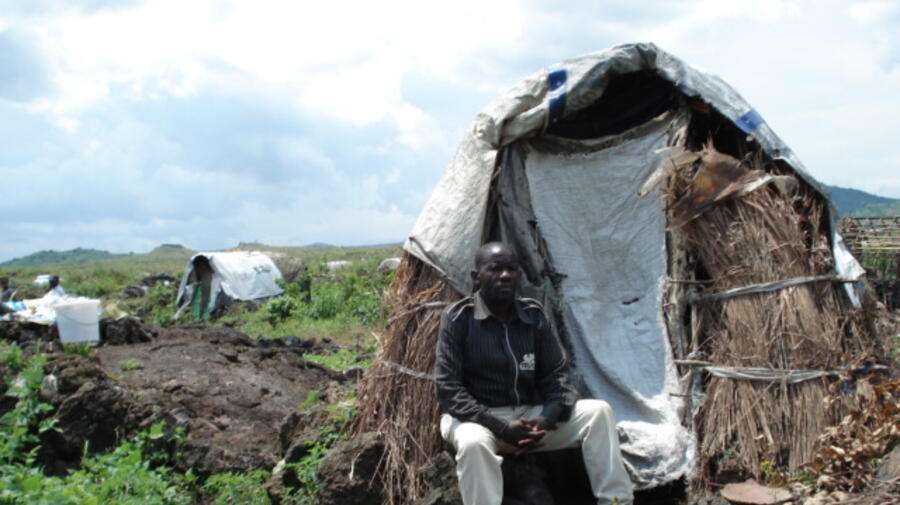
The Pygmies at Hewa Bora live in desperate conditions.
GOMA, Democratic Republic of the Congo, May 21 (UNHCR) - Among the tens of thousands of displaced Congolese people living in camps in North Kivu province, the Pygmies are particularly vulnerable and face a bleak future.
There are about 10,000 (2,400 families) ethnic Bambuti Pygmies living in dozens of camps around the volatile province after fleeing conflict in their home areas. Most live in harsh conditions, lack access to basic services, including education, and have no hope of returning to the rainforests where they came from.
A nomadic hunter-gatherer people distinguished by their short stature now find themselves having to adapt to a new way of life, their culture and traditions under threat. Moreover, they are often looked down on by other ethnic groups in the region. But UNHCR is trying to help them find new land and to ensure the sustainable integration of their communities in the areas that they have fled to.
"The Pygmies are not like other displaced people," noted Karl Steinacker, coordinator of UNHCR's operations in eastern Democratic Republic of the Congo. "The challenge for us is to help this population become a part of society and to prevent the Pygmies from becoming the real losers of this war."
About 800 displaced Pygmies live at Hewa Bora settlement, located 16 kilometres west of Goma, the capital of North Kivu. "Our life here is one of suffering," said their representative, Muhindo Mupepe, adding that they had to sleep on the bare volcanic rock that is a feature of this spectacular Great Lakes region. "We don't get any assistance like the other displaced people. When our children fall ill, we have to go and search for medicinal plants in the forest."
Things are possibly even worse for the Pygmies living in Shasha, a small settlement for internally displaced people located in Masisi district, north-west of Goma. An old Pygmy man came up to a recent UNHCR visitor and, pointing to his ragged jacket, said: "This is my clothing, my blanket and my sleeping mat - it's all I've got left."
He is one of about 280 Bambuti Pygmies at the site - half the population. They lack adequate shelter, sufficient food, household goods and basic services, including health care. There is a simple school, but most of the Pygmies cannot afford the fees and so their kids grow up ignorant, unskilled and undisciplined.
"Our children have become bandits and that creates problems for the local population," said a Bambuti spokesman, Secper Asumani, who was frustrated that almost nothing had been done to help them despite several needs assessment missions by humanitarian organizations. "Some have made promises, but nothing happened," he complained.
To stay alive, they work for local farmers. It's back-breaking toil and they get paid a pittance - less than US$1 a day. It's also irregular work and as a result many of the Pygmies must go out into the forests to look for wood, which they can later sell.
But this is a dangerous undertaking, especially for women and girls, because armed groups operate in the forests. "If we are lucky, they only take our wood," said a middle-aged mother, Marie, referring to the danger of rape - a major problem for all forcibly displaced women in the eastern Democratic Republic of the Congo.
Because of the specific problems that the Pygmies face in returning home, UNHCR and some of its key partners support their integration in the farming communities where they now live. For this, however, they need to have access to land and the refugee agency has been lobbying for this, with the government, on their behalf.
Aside from helping the Pygmies get land, UNHCR and its partners may also run shelter programmes, agricultural training and income-generation projects for these vulnerable and threatened people. The state's ability to provide access to education and other services will be important for their sustainable integration.
Mupepe, the representative in Hewa Bora, said the Pygmies were adapting. "In the past, we did not have the chance to study, but we [now] ask that our children can go to school," he noted, adding: "Perhaps one day one of them will be among the leaders of the country."
Pygmies are to be found across equatorial Africa. They are mainly hunter-gatherers but trade with farmers to acquire cultivated food and other items. There are believed to be tens of thousands of them living in the Congo rainforest.
By Céline Schmitt in Goma, Democratic Republic of the Congo

